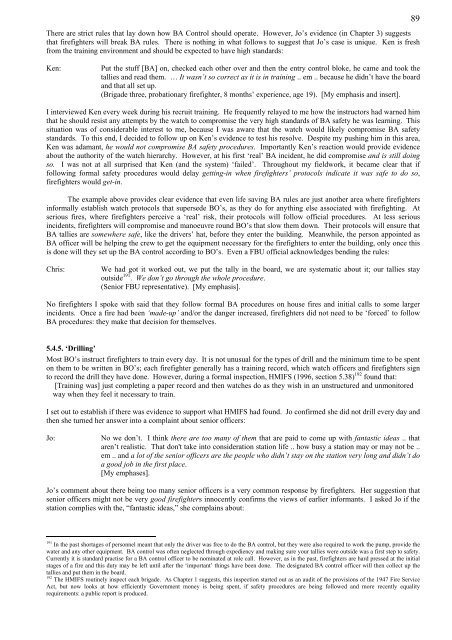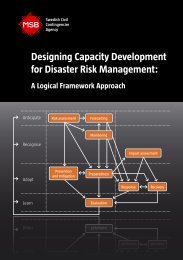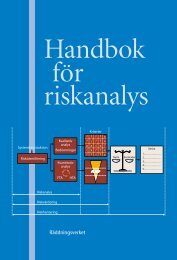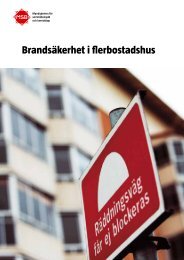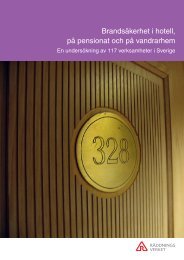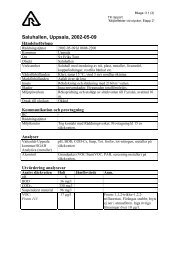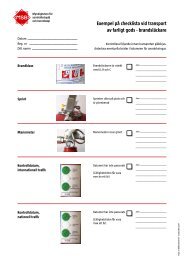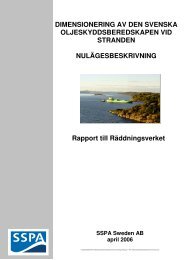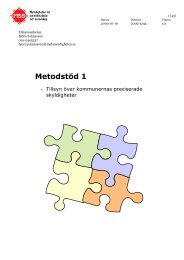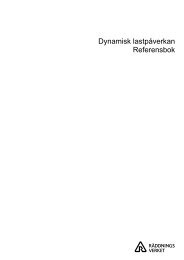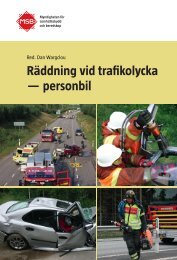One more last working class hero
One more last working class hero
One more last working class hero
Create successful ePaper yourself
Turn your PDF publications into a flip-book with our unique Google optimized e-Paper software.
There are strict rules that lay down how BA Control should operate. However, Jo’s evidence (in Chapter 3) suggests<br />
that firefighters will break BA rules. There is nothing in what follows to suggest that Jo’s case is unique. Ken is fresh<br />
from the training environment and should be expected to have high standards:<br />
89<br />
Ken:<br />
Put the stuff [BA] on, checked each other over and then the entry control bloke, he came and took the<br />
tallies and read them. … It wasn’t so correct as it is in training .. em .. because he didn’t have the board<br />
and that all set up.<br />
(Brigade three, probationary firefighter, 8 months’ experience, age 19). [My emphasis and insert].<br />
I interviewed Ken every week during his recruit training. He frequently relayed to me how the instructors had warned him<br />
that he should resist any attempts by the watch to compromise the very high standards of BA safety he was learning. This<br />
situation was of considerable interest to me, because I was aware that the watch would likely compromise BA safety<br />
standards. To this end, I decided to follow up on Ken’s evidence to test his resolve. Despite my pushing him in this area,<br />
Ken was adamant, he would not compromise BA safety procedures. Importantly Ken’s reaction would provide evidence<br />
about the authority of the watch hierarchy. However, at his first ‘real’ BA incident, he did compromise and is still doing<br />
so. I was not at all surprised that Ken (and the system) ‘failed’. Throughout my fieldwork, it became clear that if<br />
following formal safety procedures would delay getting-in when firefighters’ protocols indicate it was safe to do so,<br />
firefighters would get-in.<br />
The example above provides clear evidence that even life saving BA rules are just another area where firefighters<br />
informally establish watch protocols that supersede BO’s, as they do for anything else associated with firefighting. At<br />
serious fires, where firefighters perceive a ‘real’ risk, their protocols will follow official procedures. At less serious<br />
incidents, firefighters will compromise and manoeuvre round BO’s that slow them down. Their protocols will ensure that<br />
BA tallies are somewhere safe, like the drivers’ hat, before they enter the building. Meanwhile, the person appointed as<br />
BA officer will be helping the crew to get the equipment necessary for the firefighters to enter the building, only once this<br />
is done will they set up the BA control according to BO’s. Even a FBU official acknowledges bending the rules:<br />
Chris:<br />
We had got it worked out, we put the tally in the board, we are systematic about it; our tallies stay<br />
outside 191 . We don’t go through the whole procedure.<br />
(Senior FBU representative). [My emphasis].<br />
No firefighters I spoke with said that they follow formal BA procedures on house fires and initial calls to some larger<br />
incidents. Once a fire had been ‘made-up’ and/or the danger increased, firefighters did not need to be ‘forced’ to follow<br />
BA procedures: they make that decision for themselves.<br />
5.4.5. ‘Drilling’<br />
Most BO’s instruct firefighters to train every day. It is not unusual for the types of drill and the minimum time to be spent<br />
on them to be written in BO’s; each firefighter generally has a training record, which watch officers and firefighters sign<br />
to record the drill they have done. However, during a formal inspection, HMIFS (1996, section 5.38) 192 found that:<br />
[Training was] just completing a paper record and then watches do as they wish in an unstructured and unmonitored<br />
way when they feel it necessary to train.<br />
I set out to establish if there was evidence to support what HMIFS had found. Jo confirmed she did not drill every day and<br />
then she turned her answer into a complaint about senior officers:<br />
Jo:<br />
No we don’t. I think there are too many of them that are paid to come up with fantastic ideas .. that<br />
aren’t realistic. That don't take into consideration station life .. how busy a station may or may not be ..<br />
em .. and a lot of the senior officers are the people who didn’t stay on the station very long and didn’t do<br />
a good job in the first place.<br />
[My emphases].<br />
Jo’s comment about there being too many senior officers is a very common response by firefighters. Her suggestion that<br />
senior officers might not be very good firefighters innocently confirms the views of earlier informants. I asked Jo if the<br />
station complies with the, “fantastic ideas,” she complains about:<br />
191 In the past shortages of personnel meant that only the driver was free to do the BA control, but they were also required to work the pump, provide the<br />
water and any other equipment. BA control was often neglected through expediency and making sure your tallies were outside was a first step to safety.<br />
Currently it is standard practise for a BA control officer to be nominated at role call. However, as in the past, firefighters are hard pressed at the initial<br />
stages of a fire and this duty may be left until after the ‘important’ things have been done. The designated BA control officer will then collect up the<br />
tallies and put them in the board.<br />
192 The HMIFS routinely inspect each brigade. As Chapter 1 suggests, this inspection started out as an audit of the provisions of the 1947 Fire Service<br />
Act, but now looks at how efficiently Government money is being spent, if safety procedures are being followed and <strong>more</strong> recently equality<br />
requirements: a public report is produced.


